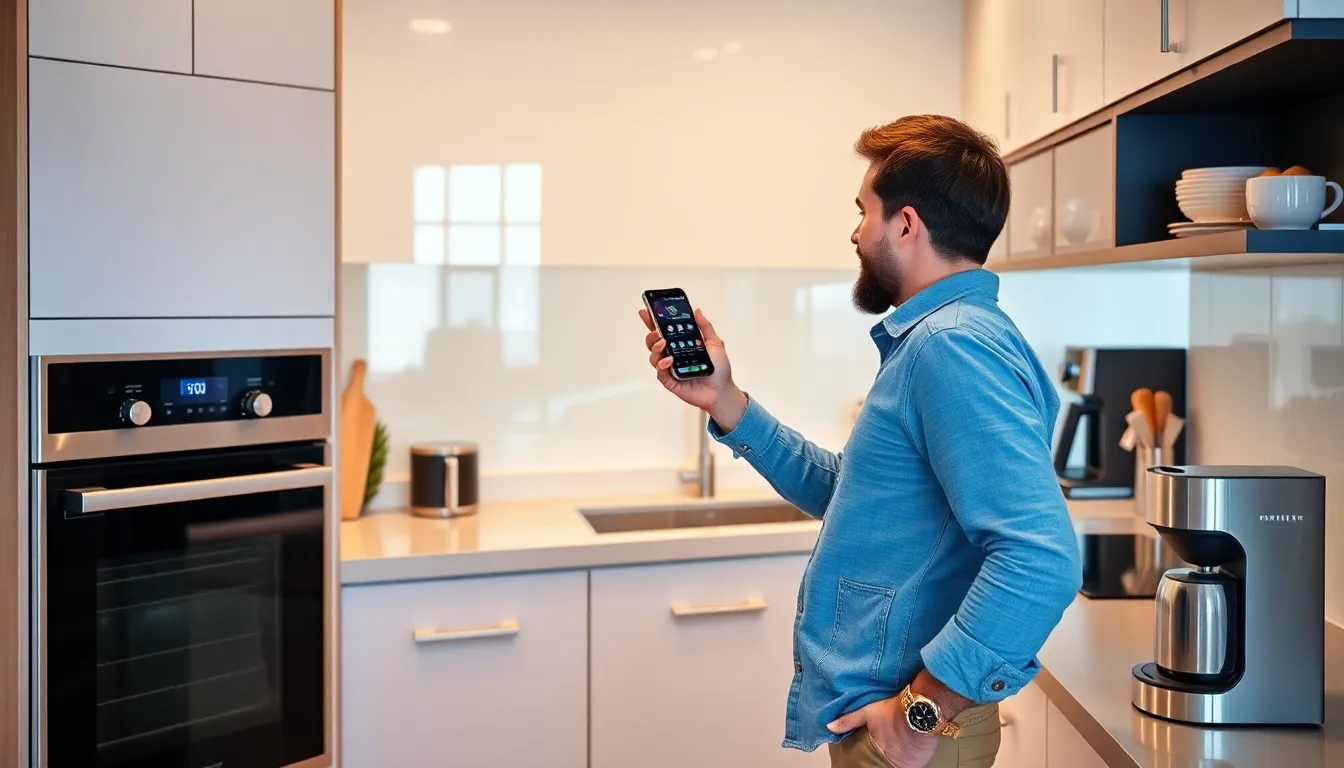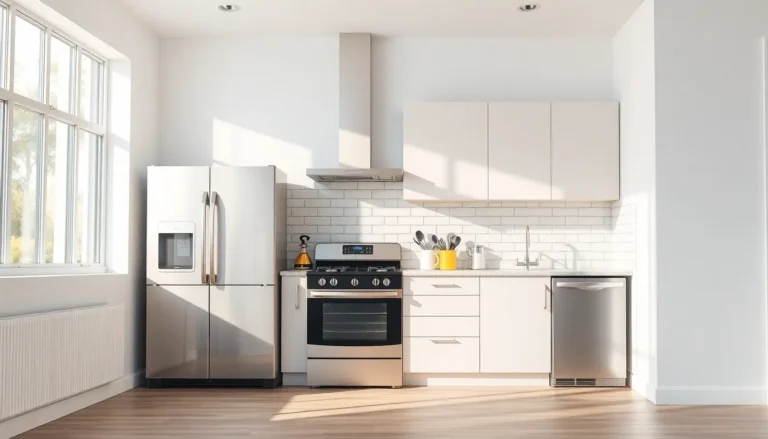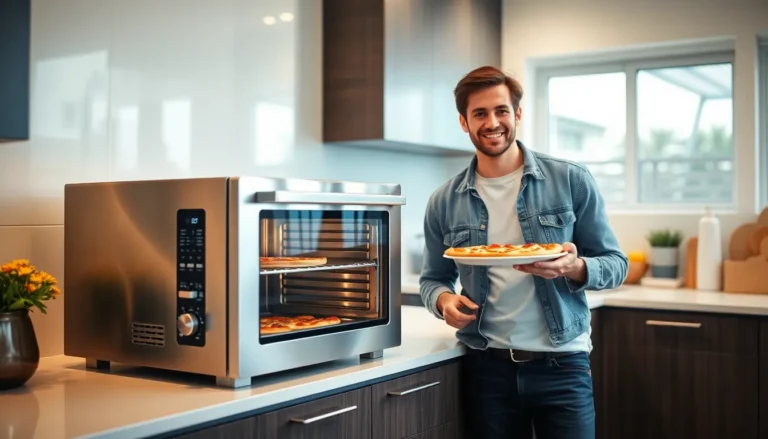Home appliances have come a long way from the clunky machines of yesteryear. Today’s gadgets are not just about getting the job done; they’re smart, sleek, and sometimes even sassy. Imagine a refrigerator that can text you when you’re low on milk or a washing machine that knows your favorite cycle better than your best friend. It’s a wild world out there, and appliances are leading the charge into the future.
As trends shift toward energy efficiency and smart technology, homeowners are embracing innovations that make life easier—and a little more fun. From multifunctional kitchen gadgets to stylish laundry machines that could double as art pieces, the latest trends are all about blending functionality with flair. Buckle up as we dive into the latest home appliance trends that are not just changing how people live, but also how they laugh while doing laundry.
Table of Contents
ToggleOverview Of Home Appliance Trends
Home appliances show a clear shift toward smart technology integration. Connectivity features in devices allow users to control appliances remotely through smartphones. Smart refrigerators now feature touch screens, enabling users to check inventories and create shopping lists without opening the door.
Energy efficiency continues to gain significance as consumers seek to lower utility bills. Many manufacturers design appliances with eco-friendly options that consume less energy. For instance, Energy Star-rated dishwashers conserve water while providing thorough cleaning cycles.
Design aesthetics also play a crucial role in current trends. Sleek lines and modern finishes attract homeowners looking to elevate their kitchen or laundry areas. Color options now extend beyond traditional white or stainless steel, resulting in appliances that complement any decor.
Sustainability drives innovation in materials used for appliances. Manufacturers incorporate recycled materials and eco-conscious manufacturing practices. These efforts appeal to environmentally conscious consumers who prioritize sustainable living.
Customization remains a high priority for consumers. Modular appliances allow individuals to tailor their configurations based on space and needs. Whether selecting different modules or integrating specific features, personalized solutions enhance efficiency and functionality.
Lastly, voice-activated technology changes how users interact with home appliances. Systems like Amazon Alexa and Google Assistant make it easier to manage household tasks. Voice commands enable hands-free operation, integrating technology seamlessly into everyday routines.
Smart Technology Integration

Smart technology integration represents a significant trend in home appliances, enhancing convenience and automation in daily tasks.
Voice-Activated Features
Voice-activated features enable hands-free control of various appliances. Devices like smart speakers integrate seamlessly with kitchen gadgets, allowing users to command their ovens or coffee makers with simple voice commands. These features simplify multitasking by providing a more accessible way to interact with appliances. Users can adjust settings, check timers, or turn devices on and off without being physically present. Research indicates that voice-activated technology improves efficiency and fosters a more connected environment within the home. Brands continuously enhance compatibility with popular voice assistants, ensuring versatile integration for various household needs.
Internet of Things (IoT) Compatibility
IoT compatibility is a game changer for modern appliances. Smart devices connect to the Internet, allowing for remote monitoring and control from anywhere. Homeowners can receive alerts about appliance status, such as when laundry cycles complete or filters need changing. This connectivity supports increased energy efficiency, as users can manage energy consumption remotely. For instance, smart thermostats learn preferences and adjust settings automatically, resulting in cost savings. The growing trend toward IoT integration fosters innovation, as manufacturers strive to create appliances that offer greater functionality while promoting a seamless, user-friendly experience.
Energy Efficiency Innovations
Energy efficiency continues to play a crucial role in shaping home appliance trends, focusing on environmentally friendly solutions that lower energy consumption. Manufacturers prioritize sustainable approaches, creating appliances that meet both performance and eco-conscious standards.
Eco-Friendly Appliances
Eco-friendly appliances utilize renewable energy sources and materials that reduce their carbon footprint. Energy-efficient washing machines minimize water and electricity usage while delivering high performance. Smart thermostats automatically adjust temperature settings, optimizing energy consumption based on household patterns. Induction cooktops distribute heat more efficiently than traditional gas or electric options. These innovations not only improve usability but also significantly lower utility bills, making them appealing to cost-conscious consumers.
Energy Star Ratings
Energy Star ratings serve as a reliable benchmark for energy efficiency in appliances. This certification indicates products that meet strict energy performance criteria set by the U.S. Environmental Protection Agency. Energy-efficient dishwashers, for instance, use 12% less water and energy than standard models. Refrigerators with this rating consume 15% less energy compared to conventional appliances. By choosing Energy Star-rated products, consumers can drastically lower their energy costs while reducing their environmental impact.
Design Aesthetics In Home Appliances
Design aesthetics greatly influence consumer choices in home appliances. Homeowners prefer sleek and modern designs that fit seamlessly into contemporary interiors.
Minimalist Styles
Minimalist styles dominate the current home appliance market. Clean lines and simple forms appeal to individuals seeking a clutter-free environment. Furthermore, appliances in neutral colors enhance the subtlety of minimalist design. Product lines showcase finishes like stainless steel and matte black, adding elegance and versatility. Brands increasingly incorporate integrated handles, ensuring a streamlined look that emphasizes functionality. Bold splashes of color are also gaining popularity in select appliance ranges, providing an option for those wanting to add personality without overwhelming their space. This trend toward minimalism aligns with the broader shift toward less visual noise in home environments.
Customizable Options
Customizable options are integral to modern appliance design. Many manufacturers offer modular systems, enabling consumers to configure appliances based on personal preferences. Custom panels allow homeowners to match appliances with cabinetry, creating a cohesive look that enhances overall aesthetics. Furthermore, color and finish options cater to various decor styles, ensuring that every customer finds the perfect fit. Integration of smart technology enhances functionality in customizable appliances, allowing users to program settings that suit their lifestyles. Through these innovations, brands not only meet aesthetic demands but also prioritize user experience, making modern kitchens a blend of style and practicality.
Sustainability In Appliance Manufacturing
Sustainability has become a cornerstone in appliance manufacturing. Manufacturers focus on using recycled materials, aiming to reduce environmental impact while appealing to consumers who value eco-friendly products. Many brands prioritize sustainable practices in their production processes to conserve resources and minimize waste.
Innovative designs frequently incorporate energy-efficient technologies. Smart appliances stand out by utilizing renewable energy sources, optimizing energy use based on user habits. For instance, energy-efficient washing machines and smart thermostats adapt to household patterns, driving down energy consumption considerably.
Certifications like Energy Star facilitate informed buyer choices. These ratings indicate products meeting stringent energy performance criteria set by the U.S. Environmental Protection Agency. Energy-efficient dishwashers, for example, utilize 12% less water and energy than traditional models, while certified refrigerators consume 15% less energy than conventional versions. By opting for Energy Star-rated options, consumers lower energy costs significantly and contribute to sustainability efforts.
Customization options in modern appliances promote both functionality and eco-consciousness. Modular appliances allow tailored configurations that meet individual needs while enhancing efficiency. Voice-activated features further contribute to hands-free control, attracting those who seek convenience without sacrificing sustainability.
Manufacturers consistently explore new ways to drive innovation through sustainability. The integration of Internet of Things (IoT) capabilities enhances user interaction, making energy-efficient appliances even more appealing. With these advancements, the appliance industry continues to evolve, meeting the demands of environmentally conscious consumers.
The landscape of home appliances is rapidly evolving. As technology advances consumers embrace smart features that enhance convenience and efficiency. The focus on energy-saving designs reflects a growing commitment to sustainability.
With customizable options and sleek aesthetics homeowners can create spaces that are not only functional but also visually appealing. The integration of eco-friendly materials and smart technologies ensures that modern appliances meet the needs of today’s environmentally conscious consumers.
As these trends continue to shape the industry the future of home appliances promises to be both innovative and sustainable.





